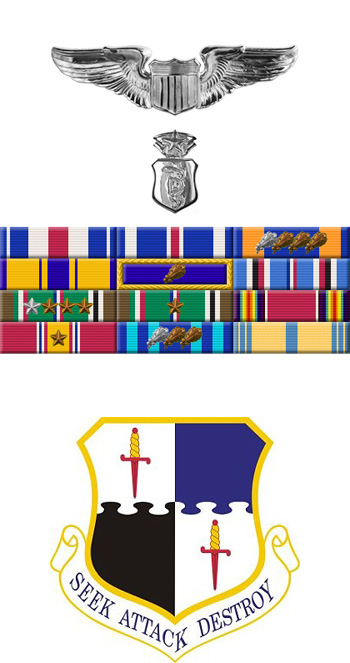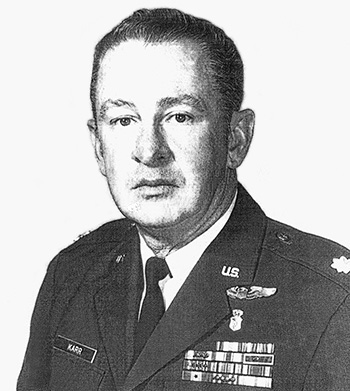
|
Robert A. Karr, D.D.S. |
 |
|||
| Rank, Service | ||||
Lieutenant Colonel O-5, U.S. Air Force |
||||
| Veteran of: | ||||
|
||||
| Tribute: | ||||
Bob Karr was born on January 11, 1924, in Waterloo, Iowa. He enlisted in the U.S. Army Reserve on July 31, 1942, and entered the Aviation Cadet Program of the U.S. Army Air Forces on February 8, 1943, receiving his commission as a 2d Lt and pilot wings at Spence Field, Georgia, on November 3, 1943. After completing P-47 Thunderbolt training and serving with the 536th Fighter Squadron of the 87th Fighter Group, Lt Karr was assigned as a P-51 Mustang pilot with the 5th Fighter Squadron of the 52nd Fighter Group in North Africa and Italy from May 1944 to June 1945. During this time he was credited with the destruction of 6 enemy aircraft in aerial combat plus 2 more damaged in the air. Capt Karr left active duty and went into the Air Force Reserve on March 24, 1946, and after receiving his bachelor's degree from the University of Iowa and entering the University of Iowa College of Dentistry, he returned to active duty on October 1, 1952, completing Dentistry College through an Air Force Institute of Technology assignment in April 1953. Capt Karr then served as a Dental Officer with the 5th Tactical Hospital and the 4167th Air Force Hospital at Travis AFB, California, from June 1953 to September 1957, followed by service as a Dental Officer with the 3926th Air Force Hospital at Ben Guerir AB, Morocco, from September 1957 to July 1960. His next assignment was as a Dental Surgeon and Director of the Dental Service with the 3525th Air Force Hospital at Williams AFB, Arizona, from July 1960 to March 1967, and then as Chief of Dental Services with the 439th Air Force Hospital (later redesignated the 475th Air Force Hospital Squadron) at Misawa AB, Japan, from March 1967 to July 1970. Col Karr served as Assistant Base Dental Surgeon with the 6510th Air Force Hospital at Edwards AFB, California, from July 1970 to October 1973, and then served as Base Dental Surgeon at Elmendorf AFB, Alaska, from October 1973 until his retirement from the Air Force on November 1, 1976. Bob Karr died on January 17, 2015, and was buried at the Zion Cemetery in Fonda, Iowa. |
||||
|
||||

